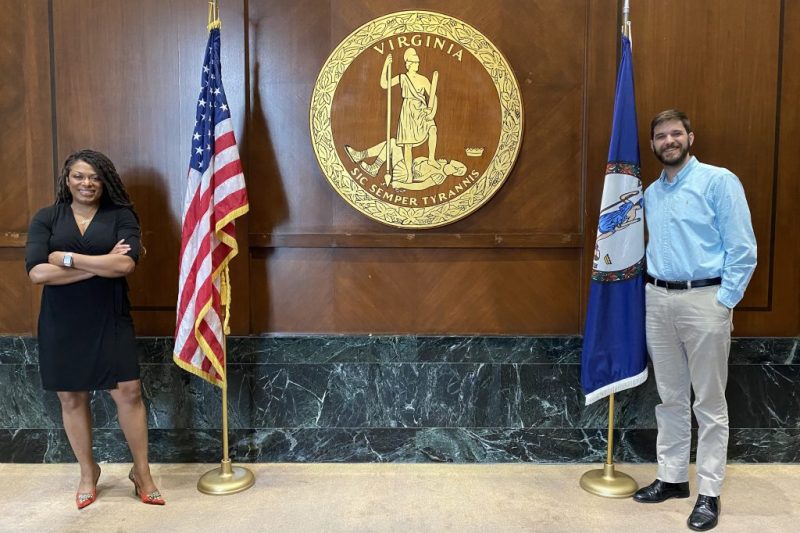Legal Eagle Life has been a series of firsts for Rita Davis ’93, who now serves as counsel to Virginia Gov. Ralph Northam.
“I’m thrilled we’re having this conversation about monuments and memorials. It’s long overdue.”
~ Rita Davis ’93
It was a Friday, about four months into her stint as counsel to Virginia Gov. Ralph Northam, when his deputy chief asked Rita Davis ’93 to sign off on the usual state proclamation honoring the birthday of James Madison, the country’s fourth president and a slave owner.
She hesitated. “As I read it, I realized that we needed to think a lot more intentionally about how we continue to portray the state’s history. So I walked into the governor’s office and explained to him why I thought we needed to develop a policy about how to deal with these issues.
“Are we going to present a more balanced account, rather than just continue to rubber-stamp these kinds of proclamations?” Northam agreed with her.
In May 2020, her colleague, Secretary of Public Safety and Homeland Security Brian Moran, asked her to weigh in on whether the governor had the authority to remove the statue of Robert E. Lee on Richmond’s storied Monument Avenue. Davis, who’d been researching the issue for over a year, said he did.
“I’m thrilled we’re having this conversation about monuments and memorials,” Davis said. “It’s long overdue. I think the absence of those conversations has allowed us, as a nation, to present only one side of history. As the great-great-granddaughter of enslaved people, I’m honored to be part of the conversation about R.E. Lee’s legacy.
These monuments represent who we are and what is important to us. I think the governor’s decision to remove Confederate statues was a very courageous thing to do.”
From English Major to Cop
Davis grew up in rural Bedford County, Virginia, and was the first in her family to graduate from college. She applied to W&L at the urging of her AP English teacher and discovered that it fit her quintessential college image — red brick, ivy and white columns.
She immersed herself in extracurricular activities, including track, the forensics team, theater, the William & Mary Leadership Institute and the Minority Student Association, serving as its president.
She did so well in one of her English classes that her professor tried to talk her into applying for a Rhodes scholarship. She also recounted how common it was to be invited to meals at the homes of her professors or faculty members. “It really made an impression on me that my professors would invite the class to their home for a meal to talk about literature and life — they went out of their way to get to know us as individuals,” she said. “That was essentially my experience at W&L.”
Davis knew from an early age that she wanted to be a lawyer. “But I also knew that my grades in undergrad weren’t good enough to get me into law school. So I needed to figure out something that would make me stand out in my applications.” She became a police officer, partly because her father said she wasn’t tough enough, but mostly for the experience. For the next three and a half years she worked for the Lynchburg City Police Department on its patrol and street crimes units, as well as its vice and narcotics squad, even going undercover for several assignments. “It gave me a lifelong appreciation for law enforcement and for those people who put their lives on the front line.”
The experience also helped her determine that she didn’t want to practice criminal law. “I don’t think I could be a prosecutor knowing what the men and women in uniform go through every day.” She eschewed family law because “I get enough drama with my own family,” and settled into civil litigation as her sweet spot. “It includes all the things I love about law — document review, taking depositions, writing summaries and appearing in court. I find all of it intriguing.”
Professional Career
After graduating from the University of Richmond School of Law — another first in her family — she clerked for the Hon. Richard S. Arnold on the U.S. Court of Appeals, Eighth Circuit. Then she joined the Richmond office of Hunton and Williams and became its first Black woman to make counsel in complex commercial litigation. Her many successes there included helping a Fortune 100 corporation defend a multimillion-dollar international breach of contract claim, arbitrating an international insurance claim and assisting Sudanese and Guatemalan victims of political torture obtain asylum.
Eye-opening
After serving in the Virginia Office of the Attorney General as section chief for Trials in the Civil Litigation Division, she got the invitation from Northam to provide oversight and legal guidance for the Office of the Governor — the first woman to ever hold that title.
“I didn’t know him professionally or personally,” said Davis. “When I interviewed with him, he was the most genuine person that you could ever meet. I knew this was going to be a good opportunity to work with someone who is thoughtful and intentional on some important issues.”
Davis has less than a year to serve and has many other policies and regulatory matters to manage besides the ongoing legal battle over Lee’s statue. “It’s been an eye-opening experience,” Davis said. “Everybody knows 2020 has been unusual, particularly at the national level, but I’ve definitely had one of the more unusual experiences in the governor’s administration.”
If you know any W&L alumni who would be great profile subjects, tell us about them! Nominate them for a web profile.
 Rita Davis ’93 (left), counsel to Virginia Gov. Ralph Northam, and LeGrand Northcutt ’17, special assistant to the governor’s counsel.
Rita Davis ’93 (left), counsel to Virginia Gov. Ralph Northam, and LeGrand Northcutt ’17, special assistant to the governor’s counsel.
You must be logged in to post a comment.